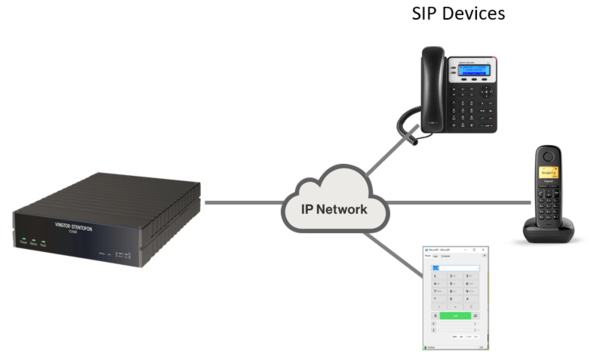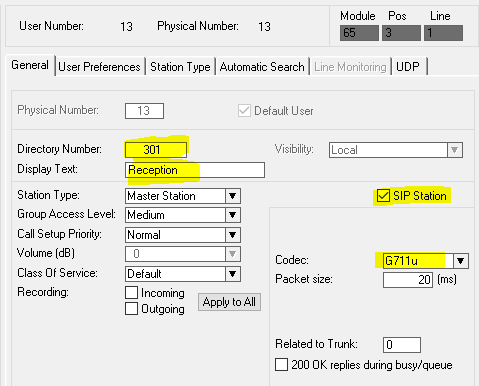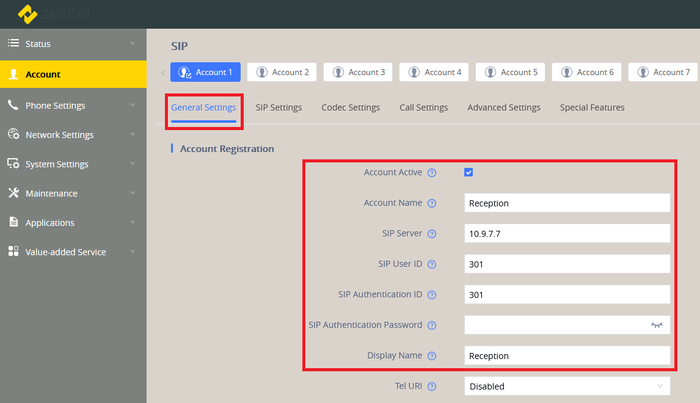SIP Devices - creating an account
From Zenitel Wiki
The ICX-AlphaCom is hosting an embedded SIP server. This article describes how to create a SIP account in the ICX-AlphaCom to which SIP devices can register.
Examples of SIP devices are:
- ITSV video intercoms
- VoIP telephones
- PC clients (Softphones)
- WiFi phones
- IP Dect systems
- Analog Telephone Adapter (ATA)
The ICX-AlphaCom supports up to 500 SIP devices.
Contents
ICX-AlphaCom Configuration
Web Configuration
- Filter settings: In the ICX-AlphaCom web interface, go to System Configuration -> Filters, and enable SIP (UDP port 5060) used for SIP signalling, and VoIP Audio (UDP ports 61000:62000). By default these ports are enabled on Ethernet port 1.
- Licenses: A "SIP station" license (item no 1002600700) is required for each SIP device.

|
A license will be consumed as soon as the "SIP Station" flag is enabled in AlphaPro, regardless if the SIP device is registered or not. |
AlphaPro Configuration
To create a SIP account, do the following:
- From the Users & Stations window in AlphaPro, select a free user from the listbox, and enable the SIP Station flag
- Configure Directory Number and Display Text
- Select a Codec which is supported by the SIP device
SIP Device configuration
Minimum settings in the SIP device:
- The IP address of ICX-AlphaCom (Typically referred to as SIP Server, Registration Server, Registrar, Domain, Proxy Domain, User Domain)
- The Directory number as defined in AlphaPro (Typically referred to as SIP User ID, SIP Account, User Name, Register Name). Often the Directory Number also must be entered as SIP Authentication ID.
- Select a Codec which is matching the codec configured in AlphaPro
A typical SIP device configuration:
Feature support
SIP devices have some feature limitations compared to native Zenitel IP devices.
Feature list
| Feature | SIP Devices (incl ITSV) | Zenitel IP Devices |
|---|---|---|
| Point to point calls | V | V |
| Caller ID | V | V |
| Duplex Conference | V (4) | V |
| Door opening (6) | V | V |
| Send Call Request | V | V |
| Member of Ringing Group | V (8) | V |
| Line Down reporting | V (7) | V |
| Receive Call Request (Call Queuing) | X (6) | V |
| Simplex Conference | X | V |
| Audio Program | X | V |
| Receive Group Calls | V (1) | V |
| Receive Voice Alarm Messages | V (1) | V |
| Receive Mail Messages (Station errors etc.) | X | V |
| Call Forwarding | X (5) | V |
| Status info in display (Call Forwarding, Absence status etc.) | X | V |
| Volume setting | V (2) | V |
| Hotline call | V (3) | V |
| Group Hunt member | X | V |
| Line Monitoring via Tone test | X | V |
- (1) The SIP phone needs to register with a second account (requiring a second SIP phone license). The second account must have AutoAnswer enabled, and be included in the group call. The flag "Allow SIP Stations in Group Calls and as default speaker in SX Conference" must be enabled in AlphaPro - Exchange & System > System > VoIP
- (2) Volume is set locally from the phone. Volume cannot be controlled from the ICX-AlphaCom server. Volume Override is not supported.
- (3) Must be supported by the phone. The Hot-Line feature in the ICX-AlphaCom cannot be used.
- (4) Only way to join a conference is for the SIP phone to dial the conference directory number. The phone cannot be remotely included in the duplex conference.
- (5) Call Forwarding (71) can be activated on the SIP phone, but there is no status indication in the phone indicating if the Forwarding is active or not. Any forwarding feature within the SIP phone it self is not supported by the ICX-AlphaCom.
- (6) Call Request is not supported on SIP phones, but Ringing Group is supported and is using the same underlying functionality. The difference is that the calls are queued in the server, not in the phone. So the user will not see any queue. As soon as the first call is terminated, the next call will come through.
- (7) Line down reporting on SIP phones is based on the "Registration expire" time out. This timeout is default quite long (30 minutes or more) on most SIP phones. If faster fault reporting is needed the registration timeout must be adjusted in the phone.
- (8) Calls via the Ringing Group feature are queued in the server, not in the phone. So the user will not see the call queue. As soon as the first call is terminated, the next call will come through.
Line Down reporting
Line down reporting on SIP phones is based on the "Registration expire" time out. This timeout is default quite long (30 minutes or more) on most SIP phones. If faster fault reporting is needed the registration timeout must be adjusted in the phone.



